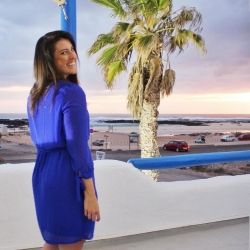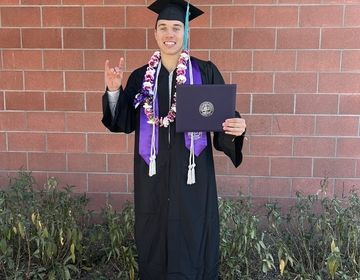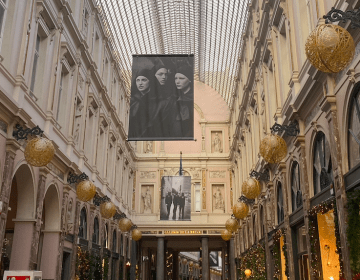Teach in Spain - Two Week Immersion: Orientation
When I discovered that Spain had a Teach Abroad program, I was immediately overjoyed. CIEE told me I could be sort of bad at Spanish and still move to Spain.
SIGN. ME. UP.
I arrived in Madrid on August 20, 2018. Without CIEE, I would have had to figure out how to get myself from the Madrid airport to, well, somewhere. In addition to the living situation, there was banking, phone plans, transportation, healthcare, and surviving the actual job of teaching. CIEE snatched all of the anxiety right out of my hands. Here's my rundown of CIEE's Two-Week Immersion orientation before the two weeks of homestay and language classes. Obviously, things change from year to year, so future orientations may differ. CIEE is very intentional about improving and making the experience the best it can possibly be.
CIEE's orientation team met us in the terminal at Madrid's Barajas Adolfo Suárez Airport. They also gave very detailed instructions on how to get to the hotel on our own in case our flights arrived outside the shuttle pickup time window. They brought us to the orientation hotel (Rafaelhoteles-Atocha) where we were checked in and assigned a room. After this, I sat on my bed freaking out. Everything I owned for the next nine months was in two suitcases in the corner, and that had me spinning off my axis a little. Luckily, there wasn't too much time to get panicky since we hit the ground running with orientation activities.
That evening, we ate dinner at the hotel and met our orientation groups and leaders. I absolutely adore the friends I made in "Grupo Ocho," and don't even get me started on our group leader, Mario. He's a native Spaniard, and he's the coolest person I have ever met or will ever meet. You will never change my mind on this, and I refuse to listen to other opinions. He was such an amazing resource for ideas about places to go and things to do in Madrid. All of us adored him.
Our schedule varied daily, but breakfast was always provided at the hotel (the good stuff, not just cereal), and the mornings were spent doing orientation sessions. CIEE covered all the important topics: housing, budgeting, banking, going to the doctor, handling emergency/non-emergency situations, Spanish culture, auxiliar expectations, teaching tips, conflict resolution, NIE/TIE process (your ID card that lets you stay in Spain- muy importante), registering for the Spanish census (required if you want to stay another year), transportation, and most importantly, they'll answer any question you throw at them.
They also brought in guest speakers:
Banco Sabadell: Vanessa from the main branch in Madrid came to speak to us about their services, and she was amazing. They gave us the opportunity to sign up for accounts right then and there, and my experience with Sabadell throughout my time in Spain has been so easy. They have ATMs all over the country, and their ATM fees are not lucrative in foreign countries either. Their app is in English and it's extremely easy to view and make changes to your account.
HM Hospitales: They have universal healthcare in Spain, which is great for them, but not for an auxiliar. When we get sick, we have to visit a private hospital, not a government-funded one. HM Hospitales was very helpful in answering questions about doctor's appointments, getting prescriptions, and justificantes (doctor's notes for absences). Children will lick their fingers and then hold your hand. They will sneeze in your eyeballs. Go ahead and assume you'll get sick. Luckily, CIEE's orientation tells you how to handle it.
Sinews: The first month living abroad is extremely taxing if you've never done it before. If you've struggled with mental health in the past, living abroad can really bring those raw feelings to the surface. Sinews is a counseling service with several English-speaking counselors. You don't realize how important this is until you're in the depths of homesickness. It was wonderful to have a number to call just in case things just got too hard.
The US Embassy: Pickpocketing is an art form and a full-time job opportunity in Madrid. I have countless friends who have gotten their valuables stolen, and they had no idea until it was far too late. The US Embassy gave us important information on what to do should that happen as well as some other valuable safety tips.
We didn't just stay in the hotel all week listening to seminars, either. CIEE showed us around Madrid and helped us really get familiar with our new home. The activities included:
Walking tours: Mario walked us around the city center, Sol. [Sidebar: How cool is it that the city center's name translates to "sun?" I love Spanish. Sometimes. Other days, I want to bang my head against the wall because the sheer volume of verbs is mind-befuddlingly astonishing. End of sidebar.] We stopped for tapas and drinks regularly because if you've never been in Madrid during the summer, you don't know the true fury of the sun. The soles of your shoes melt, and you start seeing mirages of tinto de verano at every turn. It's brutal.
Housing hunt: The search for a place to live is the single-most stressful thing for an auxiliar hoping to live in Madrid. If you do the two-week or four-week immersion, you actually arrive before the main September rush, which is a pretty nice advantage. CIEE's group leaders were available to make sure that I didn't sign away my firstborn child on a Spanish rent contract. They helped me search for apartments, put together an inquiry in Spanish (so we could momentarily fool landlords into thinking I wasn't a clueless American), and gave me tips about questions to ask during landlord meetings. I got the second place I looked at, and it was the absolute best living situation I could have imagined.
Flamenco Show: We went to dinner at Cardamomo and were treated to a live flamenco show that was phenomenal. The songs and dances were mesmerizing. I don't think I blinked the entire time.
Espicha: Based on my research, an espicha comes from the region of Asturias. It's a cider party. The cider tastes a little zany, but there were energetic servers, tapas galore, and lots of friends to laugh with- a great night in my book.
Farewell dinner at the Matadero: The Matadero is a former slaughterhouse that has been repurposed as an arts center. It was so much fun spending our last night together eating even more tapas and laughing at our horrible Spanish skills.
All of these things were so invaluable for my first week in Spain, but my favorite takeaway from the Two-Week Immersion experience was the incredible people I met. With the exception of solo trips, every weekend or holiday getaway has been with friends I made through CIEE. It's one thing to go flying out of your comfort zone into a brand new country, but no one ever said you have to do it alone. CIEE gave me comrades for getting lost in metro stations, first holidays away from home, and booking flights to random beautiful places just because we can. The memories and laughter are priceless. These close friendships will last long after my time in Spain is done- which I hope to be never, but alas, visas...
www.venture-yonder.com
Related Posts
Self Intro!
A little bit about me :) I am from Sacramento CA, and I love basketball, history, writing, and hiking! I arrived on August 12th and had so fun and memorable experiences already! try to get out of your comfort zone and try new things in all aspects of life!!
Moving to Madrid, Spain from Tennessee
This will be one of a few blog posts that I make when I primarily talk about myself, I promise. Right now, I am less than a week away from... keep reading
48 Hours in Belgium
Because Madrid has a number of bank holidays, us language assistants benefit from days off of school which are in turn, great times to travel and explore different places for... keep reading






